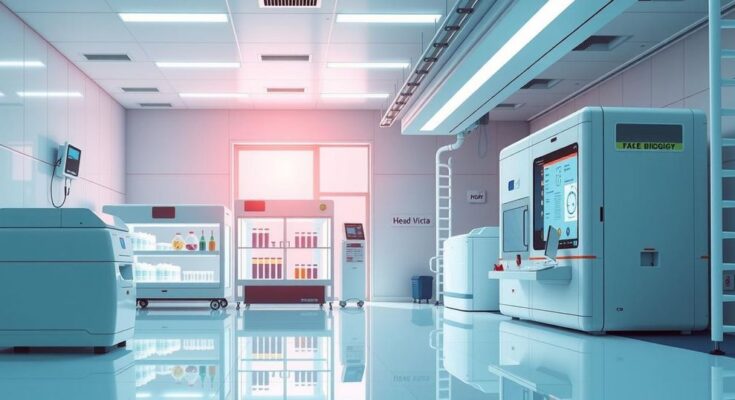The Nigerian healthcare landscape faces a pivotal moment as the global AI market surges, with diagnostics set to play a crucial role. The nation must decide between expensive imports or local AI solutions. While history has shaped its healthcare delivery, modern challenges remain, requiring urgent AI integration, infrastructure investments, and professional training. Entrepreneurs stand to benefit through innovative ventures in AI diagnostics, making immediate action critical for future success.
The healthcare artificial intelligence (AI) market is burgeoning globally, anticipated to reach $102.7 billion by 2028, with medical diagnostics poised to account for a substantial share. Nigeria stands at a crossroads: facing the choice between relying on costly imported diagnostic services or developing homegrown AI-driven systems tailored to its unique healthcare challenges.
Historically, Nigeria’s healthcare system evolved from traditional practices into a more structured system during the colonial period, yet it remains distant from global best practices. Although diagnostic laboratories exist across major cities and rural areas, the reliance on outdated methods persists. To remain relevant by 2025, the country must integrate AI into its diagnostic processes, which are currently lagging behind leading nations.
AI technologies have transformed fields such as imaging and radiology, where platforms like Google’s DeepMind and PathAI analyze medical images with remarkable accuracy. Additionally, predictive diagnostics enable AI to identify potential diseases based on genetic information and lifestyle factors even before the symptoms manifest. AI applications in histopathology expedite laborious sample analysis while enhancing precision, and Point-of-Care diagnostics could revolutionize access to healthcare in even the remotest locales.
The expectations for Nigeria’s diagnostic future include fully automated laboratories, where AI will manage all processes, and technology becoming an indispensable assistant to healthcare professionals. The proliferation of mobile-first diagnostics and AI-enhanced precision medicine will tailor treatments based on individual patient profiles. Moreover, AI is forecasted to significantly bolster the global economy by 2030, positioning Nigeria strategically to benefit from this trend or risk being sidelined.
Sadly, Nigeria’s current healthcare infrastructure is ill-equipped for an AI revolution, compounded by issues like inconsistent power supply and inadequate internet access. Medical professionals also require substantial training to effectively leverage AI advancements. Immediate and concerted action is required to harness the potential of AI in diagnostics through investments in infrastructure, healthcare curricula, and data protection laws.
The commercial viability of AI in medical diagnostics presents vast opportunities for entrepreneurs. Establishing AI-powered diagnostic startups and innovative health-tech devices suited for Nigerian demographics could shape the future of healthcare. Furthermore, training programs and attracting foreign investment will ensure the sustainability of this new industry.
It is imperative to recognize that AI is no longer optional; it is poised to penetrate every sector, including healthcare. For the Nigerian healthcare system, AI’s integration into diagnostics is not merely beneficial but essential for enhancing care quality and affordability. This revolution must commence immediately, lest the nation pays dearly in lives and resources for its lagging response to technological advancement.
In conclusion, Nigeria stands at a critical juncture in its healthcare evolution, where the adoption of AI in diagnostics is both a necessity and a significant opportunity. Current infrastructure challenges must be addressed, and proactive measures be taken to leverage AI for improved healthcare outcomes. Entrepreneurs can capitalize on innovative solutions that build a sustainable future, while the nation prepares to engage fully in the burgeoning AI healthcare market.
Original Source: businessday.ng




